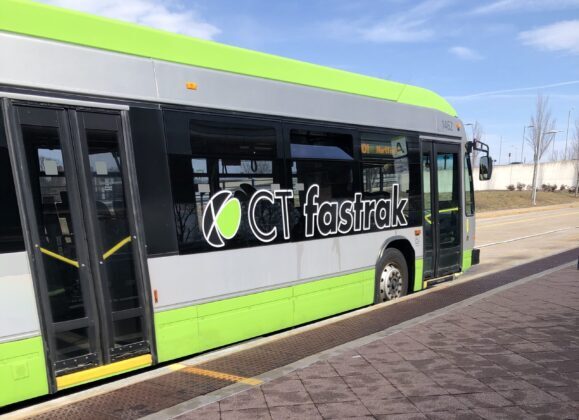On the same day that the IPCC Synthesis Report was released, telling us — essentially — that it’s time to shit or get off the pot, local headlines announced that Connecticut’s public transit would cease behaving as a public good, with the return to fare collection on April 1, 2023.
It’s not a joke. This is our decision-makers not understanding the assignment.
The assignment has been so clearly spelled out by the scientists:
They even made an infographic. It can’t be simplfied any more than this.
Even though people have the capacity to change rules created, often arbitrarily, by humans, Connecticut has so far opted to revert to a failed system by downgrading public bus service statewide.
What will these service changes look like?
We’ll circle back to that momentarily. It needs to be said that frenemies love to claim that we can only have free public transit or good public transit, and in the announcements of resumed fare collection, there have been no details about improved schedules. If you were hoping for, say, Sunday service on the 53 or 56, you’re out of luck, pal. Want to catch the 62 from Bishop’s Corner later than 7:07 on a Friday night? Sorry, they won’t be giving us that either.
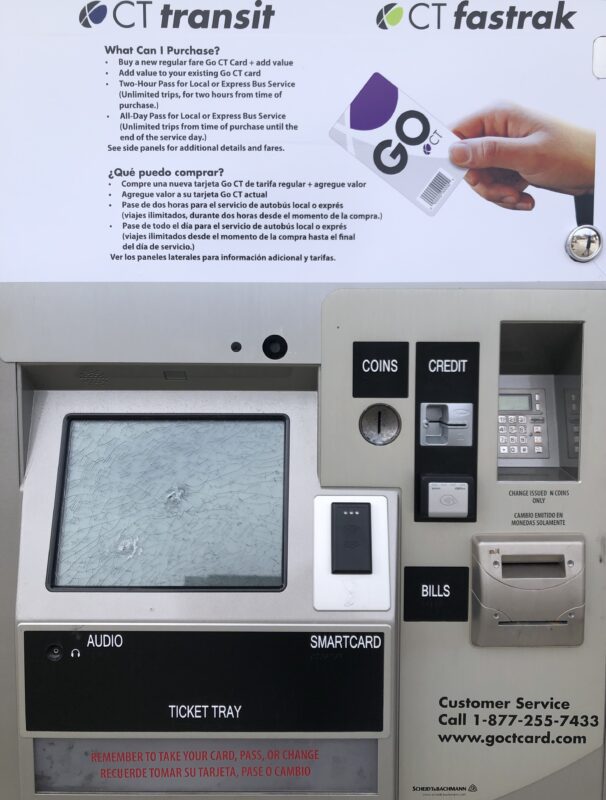
I don’t have a crystal ball, but I do have experience riding buses several days every week, generally for running errands but sometimes for traveling to work or elsewhere. I can recall what public transit was like when fares were collected previously. What’s quite likely coming on April 1, 2023?
Longer boarding times caused by passengers struggling to get the fare box to accept anything but the crispest dollar bill.
Delays because of riders paying their way in nickels, which if fare collection occurs, we must continue to allow for reasons of inclusivity. People who never or rarely ride the bus are not attuned to this reality.
We can expect, unless by some miracle they fixed all the scanners, customers to be falsely told that our Go CT cards have insufficient funds despite having an actual $20 balance. This has happened to me about every third time I’ve used my card. More delays.
We can expect that the payment app will only scan when the moon is in the seventh house. More delays.
Longer boarding times while someone short on cash asks around to borrow a quarter.
The service downgrade will appear as annoying clusterjams waiting to board, standing out in the elements while someone three people ahead of you drops coin after coin in the box.
It means impatient bus drivers recklessly rejoining the roadway while people are still standing at the front of the bus, paying their fare.
It’s not your imagination: the fare box causes delays. When you take away the payment-at-time-of-service model, boarding times are reduced by 20%.
Will I be surprised if buses are delayed also by passengers who can’t or won’t pay, and then become belligerent if the driver decides to refuse service? Not at all. (How many resources are going to be thrown into ensuring fare collection and providing drivers with additional support if there is a hostile passenger?)
This basically guarantees that buses on routes with more than a handful of riders will be late. Having infrastructure like consistent bus only lanes would help to speed up flow, but Hartford has not had the guts to implement any yet. They do exist in other parts of the state, however:
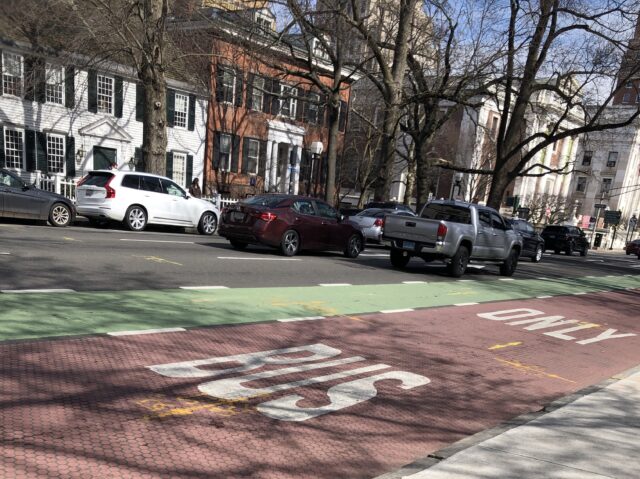
Lateness is disrespect in that most bus routes have such infrequent service that one has to show up excessively early to guarantee not being late for whatever responsibilities they have, or, taking a gamble.
So far, I have not talked about financial hardship — just the annoying and disrespectful impact on our time. When you ride the bus, your time is routinely not valued. We know this because most routes do not have frequent, late night, or robust weekend service.
We also know this because there is not an equitable geographic distribution of places to reload payment cards. For those in Hartford who cannot reload online, it initially appears like there are lots of options:
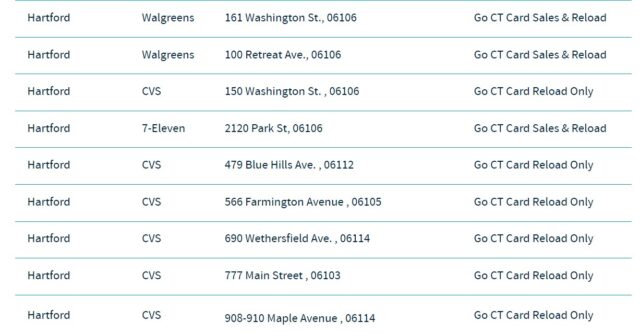 Here’s what this looks like on a map:
Here’s what this looks like on a map:
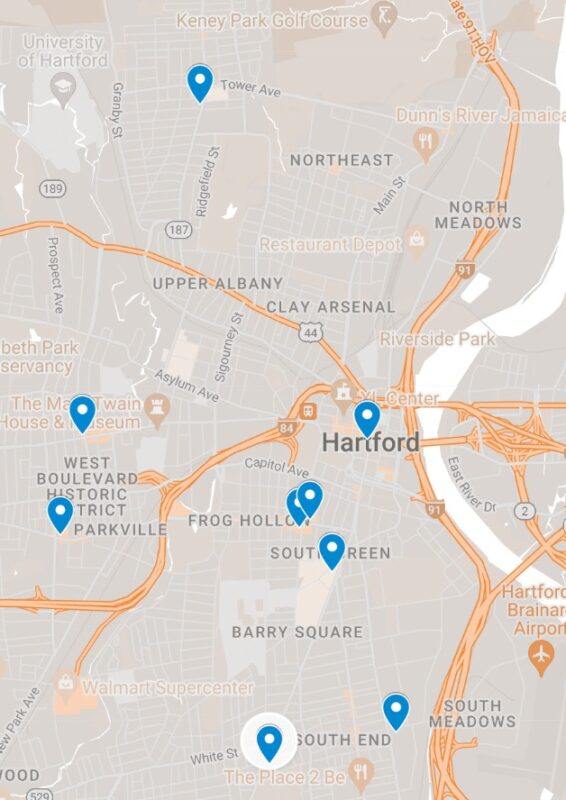
Distance on a bus is not the same as by car. For some riders, this means having to take multiple buses to get a card refilled. More time lost.
There are some refill stations at CTfastrak stations — not shown on map — but that does not add any access for passengers who live in the Northeast, Upper Albany, or Clay Arsenal neighborhoods.
Although public transportation should be treated as a public good, there are those who have not tried to listen to what this means.
I’ll try again.
If parents were told that they were going to have to begin paying tuition so their little darlings could attend public school, they would riot in the streets.
Those of us who have chosen to abstain from adding to the population could make the case that it is not our responsibility to pay daycare/schooling fees for others’ children. Your body, your choice, your financial responsibility. We’re not monsters, though! Those who have trouble paying could get discounts, but they’ll have to fill out the paperwork to be mailed their children’s passes. There can be about a half dozen ways to pay, because equity, and it will take forever for kids to get through the door in the morning but if you respect teachers then you will submit to this Byzantine system and stop asking so many questions. Your kid lost their monthly tuition pass? That’s money you can’t get back. Don’t have reliable internet at home or a bank account? Go to any of the tuition card refill stations, none of which are both open after your work shift and somewhere you can reach in under half an hour or with fewer than two bus rides.
Why would anyone accept this system?
Yet, that’s what it sounds like when someone suggests that (1) convoluted payment systems are remotely sensible, and (2) only public transit users should pay, even though mass carpooling — another way to think of buses — is something that benefits all of us.
We know how public schools are funded. We all pay into it, annually, via taxes. We all benefit from a society in which everyone has access to basic education. Why is it hard for folks to grasp that public transportation should function the same? It benefits all of us for people to have basic mobility needs met.
When will we get out of our own way and do what makes sense?
